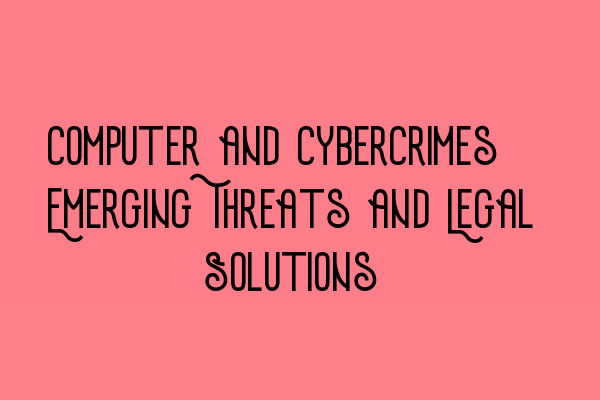Computer and Cybercrimes: Emerging Threats and Legal Solutions
In today’s digital age, the world has become more interconnected than ever before. While this has opened up numerous opportunities for innovation and growth, it has also led to an increase in computer and cybercrimes. Criminals are now exploiting the vulnerabilities of technology to commit a wide range of illegal activities.
As a solicitor specializing in criminal law and practice, it is essential to stay ahead of the emerging threats and understand the legal solutions available to combat these crimes effectively.
Understanding Computer and Cybercrimes
Computer and cybercrimes encompass a wide range of illegal activities committed using computers, networks, and the internet. These crimes include but are not limited to:
- Identity theft
- Hacking
- Distributed denial-of-service (DDoS) attacks
- Ransomware
- Phishing
- Malware and spyware
- Online fraud and scams
- Unauthorized access to computer systems
These crimes not only impact individuals but also organizations and even governments. The financial, reputational, and psychological consequences of computer and cybercrimes can be devastating.
Emerging Threats
As technology evolves, so do the methods used by cybercriminals. It is crucial to stay up to date with the emerging threats to effectively counteract them. Some of the prevalent emerging threats include:
- Internet of Things (IoT) vulnerabilities: With the increasing number of interconnected devices, hackers can exploit vulnerabilities in these devices to gain unauthorized access to sensitive information.
- Artificial intelligence-powered attacks: Cybercriminals are leveraging the power of artificial intelligence to automate their attacks and evade detection.
- Cryptocurrency-related crimes: The decentralized nature of cryptocurrencies presents new challenges in investigating and prosecuting crimes involving digital currencies.
- Social engineering: Sophisticated phishing attacks and social engineering techniques are used to manipulate individuals into revealing sensitive information.
The Legal Framework
To combat computer and cybercrimes effectively, legal frameworks must be in place. In the UK, the Computer Misuse Act 1990 is the primary legislation governing such offenses. It criminalizes unauthorized access, modification, and disruption of computer systems.
Additionally, the Investigatory Powers Act 2016 provides powers to law enforcement agencies to investigate and prevent serious crime, including computer and cybercrimes. This act offers a legal framework for interception, retention, and acquisition of communications data.
Legal Solutions
Enforcing existing legislation and implementing new legal solutions is crucial in the fight against computer and cybercrimes. These solutions include:
- Enhanced legislation: In response to emerging threats, governments need to continually update and strengthen computer crime legislation to ensure it covers new methods and technologies used by cybercriminals.
- International cooperation: Cybercrimes are often transnational in nature, requiring close cooperation between law enforcement agencies across borders to effectively investigate and prosecute offenders.
- Education and awareness: Promoting awareness and providing education about computer and cybercrimes can help individuals and organizations protect themselves from falling victim to these offenses.
- Technological advancements: Investing in advanced cybersecurity technologies can help detect and prevent cybercrimes.
- Training and expertise: Ensuring solicitors and legal professionals undergo continuous training and possess expertise in computer and cybercrime law is essential to effectively combat these offenses.
As a leading law firm offering comprehensive SQE 1 and SQE 2 preparation courses, we understand the importance of keeping up with the latest developments in criminal law and practice. Our courses cover topics such as computer and cybercrimes, providing aspiring solicitors with a strong foundation to tackle these emerging threats.
For further information on SQE practice exam questions and SQE 1 and SQE 2 preparation courses, visit our related articles:
- SQE 1 Practice Exam Questions
- SQE 1 Practice Mocks FLK1 FLK2
- SQE 2 Preparation Courses
- SQE 1 Preparation Courses
- SRA SQE Exam Dates
Combatting computer and cybercrimes requires a proactive approach from solicitors and legal professionals. By understanding the emerging threats and legal solutions, we can work together to protect individuals and organizations from the devastating consequences of these offenses.
